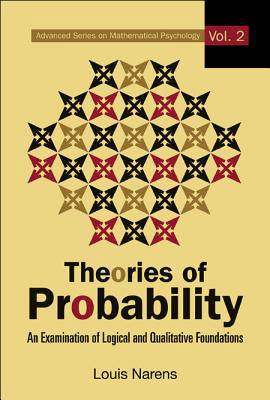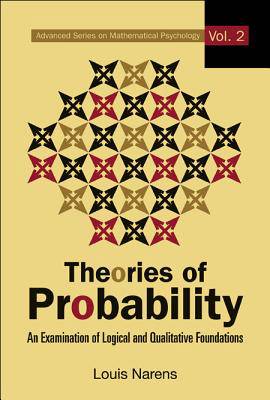
- Afhalen na 1 uur in een winkel met voorraad
- Gratis thuislevering in België vanaf € 30
- Ruim aanbod met 7 miljoen producten
- Afhalen na 1 uur in een winkel met voorraad
- Gratis thuislevering in België vanaf € 30
- Ruim aanbod met 7 miljoen producten
Zoeken
Theories of Probability: An Examination of Logical and Qualitative Foundations
Louis E Narens
€ 148,45
+ 296 punten
Omschrijving
Standard probability theory has been an enormously successful contribution to modern science. However, from many perspectives it is too narrow as a general theory of uncertainty, particularly for issues involving subjective uncertainty. This first-of-its-kind book is primarily based on qualitative approaches to probabilistic-like uncertainty, and includes qualitative theories for the standard theory as well as several of its generalizations.One of these generalizations produces a belief function composed of two functions: a probability function that measures the probabilistic strength of an uncertain event, and another function that measures the amount of ambiguity or vagueness of the event. Another unique approach of the book is to change the event space from a boolean algebra, which is closely linked to classical propositional logic, to a different event algebra that is closely linked to a well-studied generalization of classical propositional logic known as intuitionistic logic. Together, these new qualitative theories succeed where the standard probability theory fails by accounting for a number of puzzling empirical findings in the psychology of human probability judgments and decision making.
Specificaties
Betrokkenen
- Auteur(s):
- Uitgeverij:
Inhoud
- Aantal bladzijden:
- 232
- Taal:
- Engels
- Reeks:
- Reeksnummer:
- nr. 2
Eigenschappen
- Productcode (EAN):
- 9789812708014
- Verschijningsdatum:
- 1/12/2007
- Uitvoering:
- Hardcover
- Formaat:
- Genaaid
- Afmetingen:
- 166 mm x 229 mm
- Gewicht:
- 544 g

Alleen bij Standaard Boekhandel
+ 296 punten op je klantenkaart van Standaard Boekhandel
Beoordelingen
We publiceren alleen reviews die voldoen aan de voorwaarden voor reviews. Bekijk onze voorwaarden voor reviews.











